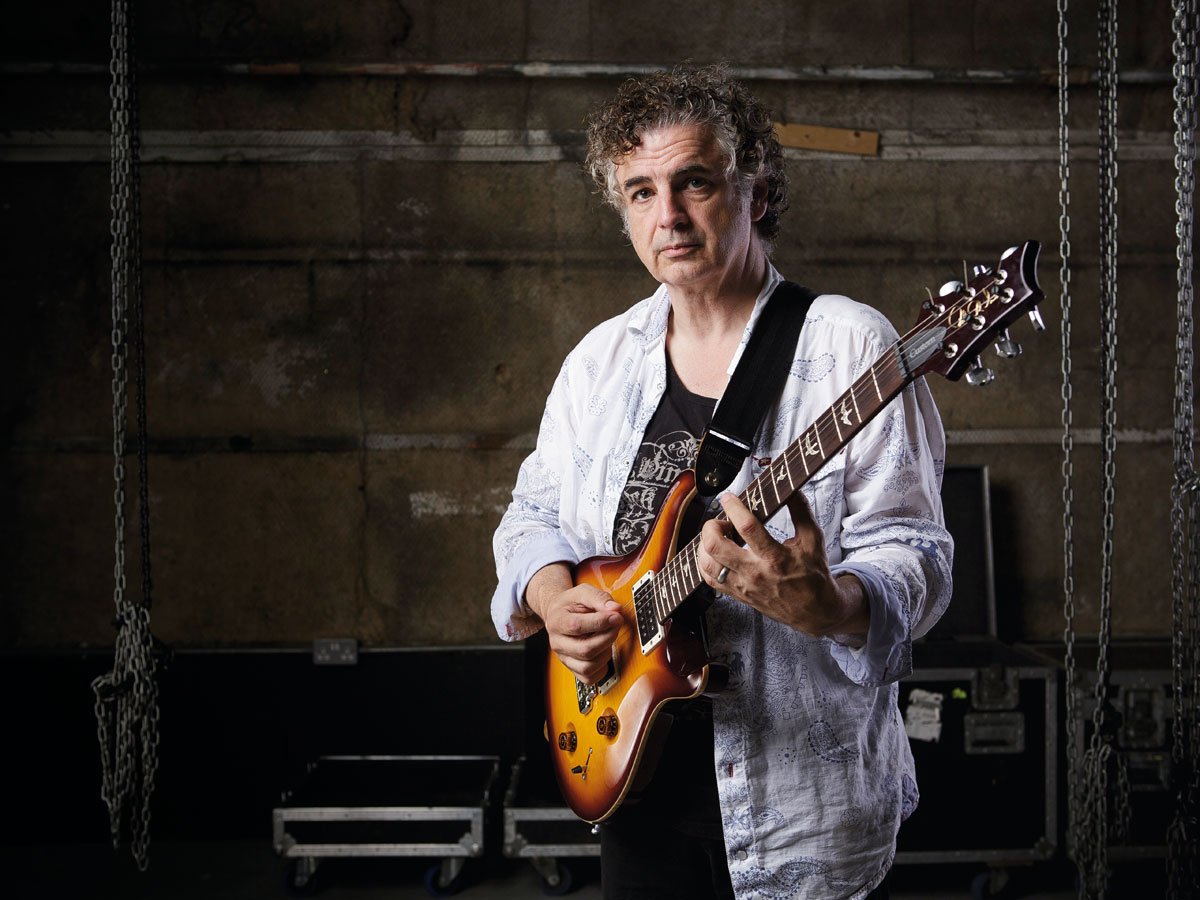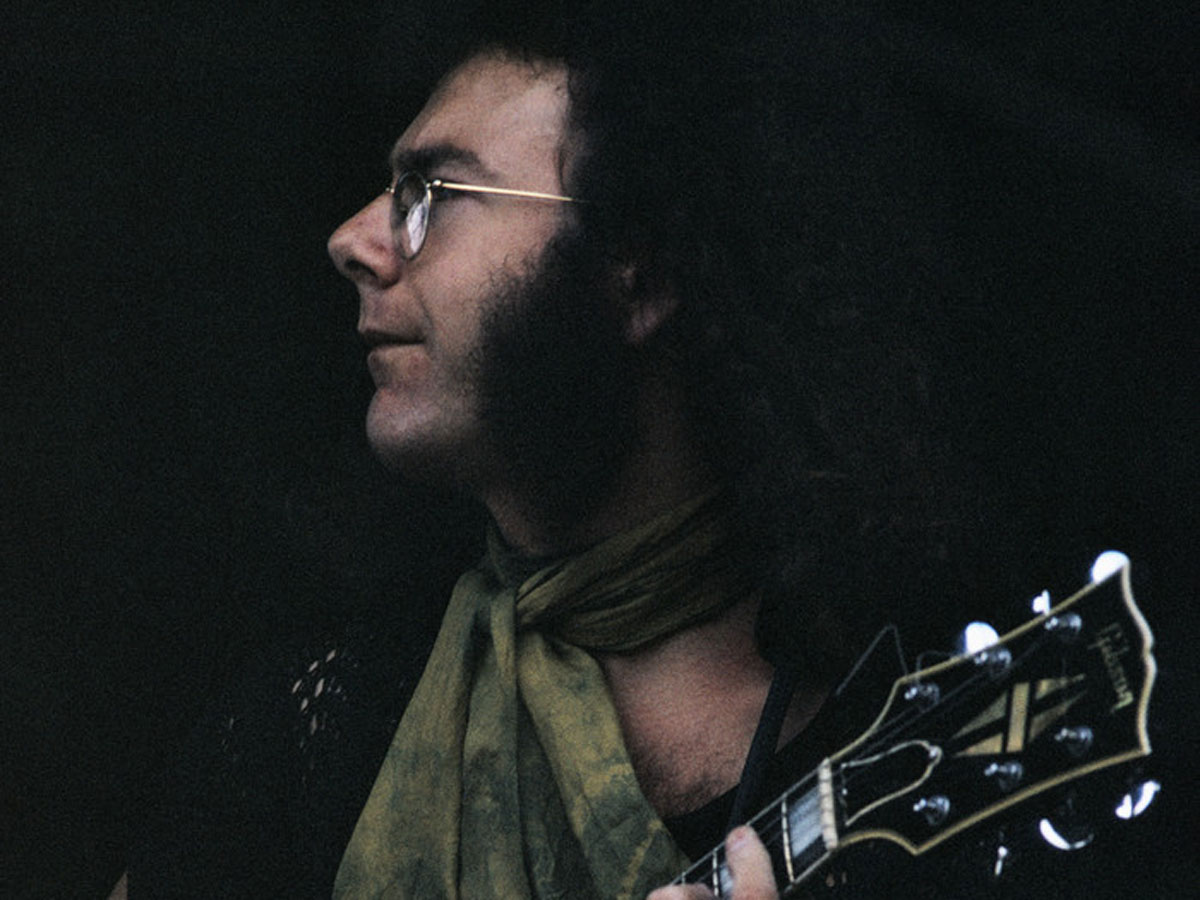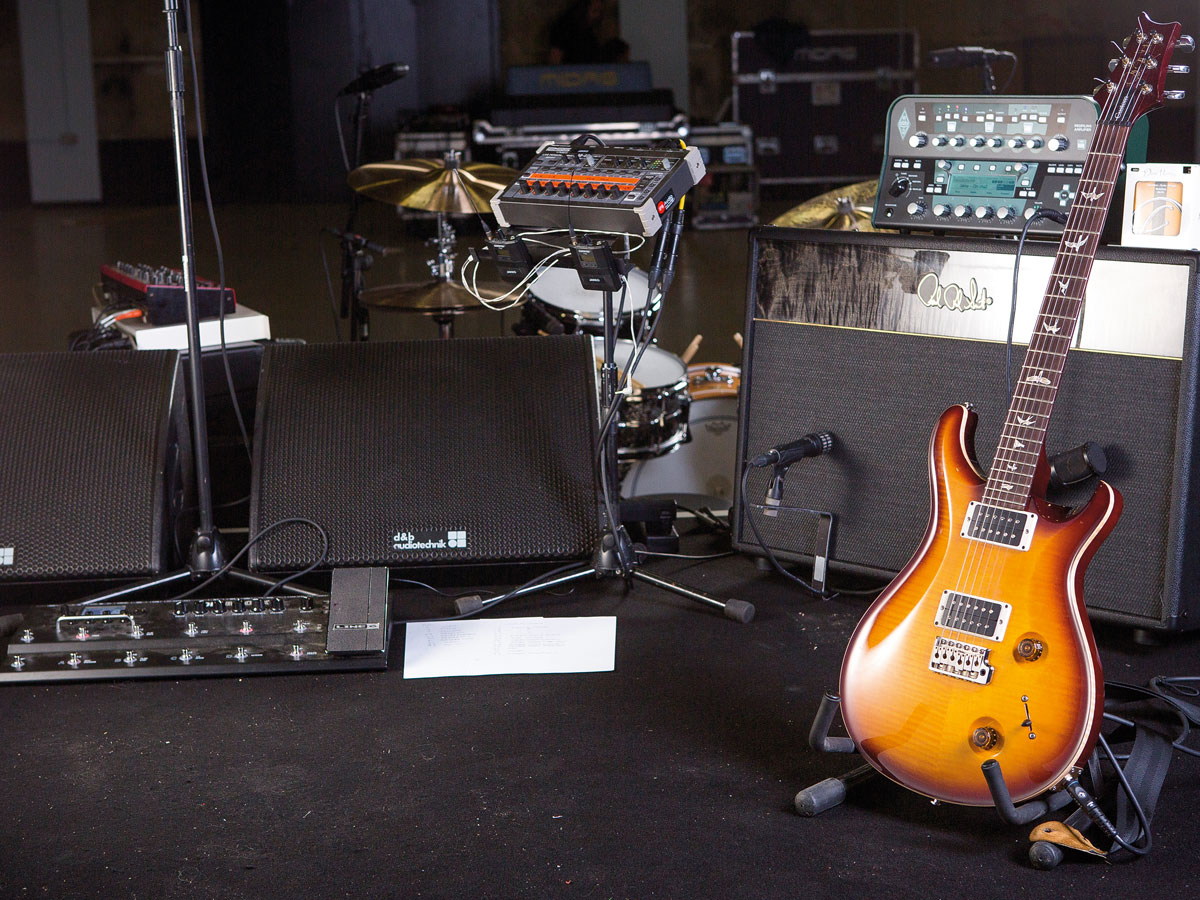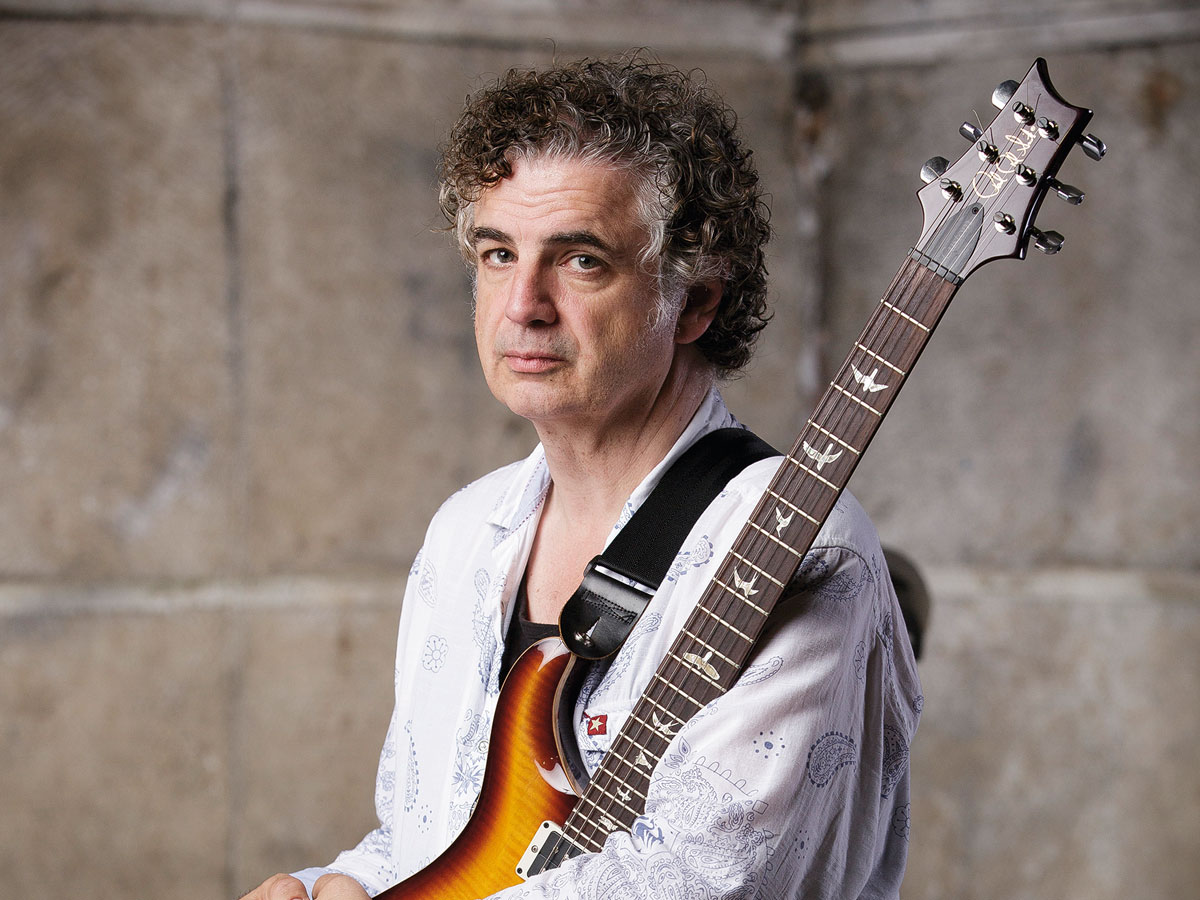Jakko Jakszyk on King Crimson, Fripp and joining his heroes
The prog guitar maestro talks lifelong audition

Introduction
Four decades after Jakko Jakszyk first saw King Crimson live, he was invited to join the group. Being tasked with fronting your favourite band would daunt most players, but Jakko has really put in the hours...
It is rare that you’re given the chance to join not just an established band, but the one you hold dearest. Guitarist Jakko Jakszyk first witnessed King Crimson at a concert when he was just 13 and spent the following years forging a career as a songwriter, session maestro and a front- rank prog guitarist.
Both by accident and design, he found himself working with a sizeable chunk of the ever-changing band’s 21-member alumni, before getting drafted in by lynchpin and leader Robert Fripp in 2013. Now, as Jakko prepares for his live debut in the US, he talks to Guitarist about his lifelong audition, the playing challenges and working with the ‘venal leader’.
"I was a King Crimson fanboy. I saw them in Watford Town Hall in 1971 and it blew my head off"
How did you come to join King Crimson?
“When Robert Fripp asked if I wanted to be in the new King Crimson line-up, one of the first people I called was the bass player, Nick Beggs. Nick’s response was: ‘That’s the longest audition in rock history!’ Because I was a King Crimson fanboy. I saw them in Watford Town Hall in 1971 and it blew my head off. I had a romanticised idea that this one event had changed my life on some enormous level.
“Then, in the 80s, I met and worked with [original lyricist] Pete Sinfield, and when [in 2002] he picked up the idea of playing the early stuff with ex-Crimson members, he asked me if I’d be the guitarist/vocalist, because he knew what a fan I was. That culminated in the 21st Century Schizoid Band, where everyone in the band, apart from me, had been in King Crimson.
“Then Ian Wallace [former King Crimson drummer and Schizoid member] tragically died, and after his funeral Robert Fripp invited me for lunch and asked me to improvise with him. We recorded all this stuff and [eventually] created the record A Scarcity Of Miracles, which came out as a King Crimson ProjeKCt [a ‘Crimson-endorsed side-project].
“So there was this whole background, but even when Robert eventually phoned and asked would I like to be in the new King Crimson, I was surprised because he had announced his retirement from the music industry. It came out of the blue.”

Getting Frippery
How did you find taking on that mantle? Presumably, you’re not handling any of Robert’s duties this time...
“I am actually! Because Robert reappraised how he was playing the guitar in the 1980s and developed his Guitar Craft approach and what he calls ‘New Standard Tuning’, which is C G D A E G and significantly different to normal tuning.
"So when it came to older material, Robert said to me, ‘You’re playing in the old tuning, why don’t you play it?’ There was a moment’s silence where I was looking at him, thinking, ‘Is this a joke?’ So I then had to learn how to play these fiendishly difficult cross-picked parts!”
"[Robert Fripp] often refers to himself self-deprecatingly as the ‘venal leader’, but I haven’t seen that"
Has the band’s long history of reinvention made it easier for you?
“I think so. One of the questions I’ve been asked is, ‘How does it feel to replace Adrian Belew?’ And I think, ‘Well... I’m not!’ In the same way that Adrian Belew didn’t feel like he was replacing [vocalist/bassist, 1972-74] John Wetton. You don’t feel, ‘I’m stepping into this bloke’s shoes’.
"I don’t know if it makes it easier, but it allows you to go into it with a different mindset. Also, the band’s been going since 1969, so while there’s a recognisable harmonic and rhythmic centre that makes it King Crimson, a lot of the music sounds very different.”
What is it like working with Robert Fripp?
“I can only speak of this version of the band, and this version of Robert Fripp. I’ve read all the books, I’ve read all the reports of his ‘daunting personality’, and he often refers to himself self-deprecatingly as the ‘venal leader’, but I haven’t seen that.
"I hate to smash a perception that I know he’s quite keen on perpetuating, but he’s been incredibly supportive and he’s very encouraging of you ‘being you’. He will tell you what he doesn’t like, but he’s not dictatorial, or like I imagine Frank Zappa was, whom he’s often compared to.”
Has it changed your perspective on any of the material?
“It’s interesting, because sometimes when you dismantle something, you think, ‘Blimey! Is that it?’ But there is something about this music that, even when you completely pull it apart, there is still something magical about it.”

Profiling the tones
What were your thoughts when choosing the gear to use in this role?
“My first thought was, ‘Let’s keep this simple, because quite frankly I’ve got enough to concentrate on just playing the sodding notes.’
“My first thought was, ‘Let’s keep this simple, because quite frankly I’ve got enough to concentrate on just playing the sodding notes.’
"There were other concerns, too. Robert has decided to have three drummers on the floor, while we’re on risers above them, so I can’t have a 50-watt valve head turned up full, because the first thing that’s going to hit will be three sets of overhead mics.
“At the second lot of rehearsals, Tony Levin was using a Kemper Profiling Amp because he could profile his bass rig and get the sound on top of these risers. He knows Christoph Kemper, so they very kindly sent me one. Right now, I’m using that with a Line 6 POD HD500 as a controller on the floor. Then I’m putting the Kemper through a PRS 2x12 cab, just to get a bit of air.”
And we hear you’ve also got a custom PRS on the way?
“Yeah, it’s based on a P22 Custom, but we’ve made a version of the screaming face from the first King Crimson album [In The Court Of The Crimson King]. It’s an extraordinary-looking thing. The piezo helps with more acoustic-sounding things. It gives you an attack, which is great on arpeggiated stuff.”
How much consideration have you given to emulating tones from the band’s past?
“There are certain tunes where I’m trying to emulate them as authentically as possible and times where I’m not. For instance, Sailor’s Tale, the original has two guitars, because Robert’s tracked them both, so I’m trying to make that sound like Robert back then so that those parts become a section.
“At one point, much to Robert’s amusement, I was playing about with the modeller and he said, “That’s a good sound! What’s that?’ I said, ‘It’s a preset I found on the Kemper. It’s called Early Fripp!’ He thought that was very funny.”

Going live
Are there any tracks that you’re worried about playing live?
"You can’t think, ‘Oh yeah, I know that’ and then turn up to rehearsal. You need to be on top of it."
“There are some recent things that require an enormous amount of concentration. It’s not just you, it’s the complete interaction of everybody. Then there’s the earlier stuff, like Larks’ Tongues In Aspic, which I loved as a kid and I’m excited to be playing it, but reasonably daunted at being the bloke doing it. I’m practising constantly. You can’t think, ‘Oh yeah, I know that’ and then turn up to rehearsal. You need to be on top of it.”
What other material has made the setlist for the forthcoming tour?
“It’s ever-evolving. Some stuff has been added, other stuff has been dropped and there are whole areas of improvisation. There’s one tune which is based on a selection of notes, and an assigned band member dictates how and when they are being played. It’s that improvisational element of the early Crimson, which kind of disappeared, so we’re allowing space to accommodate that.
"Then there’s talk of a future where there might be brand-new material. Some of that has been recorded in a form and other stuff has been presented. Certainly, it does not feel like reforming for a one-off tour and then disappearing.”
What’s the atmosphere like in the band ahead of your return?
“It’s been a joy. It’s a really nice group of personalities as well as musicians. Robert said in a recent interview that he’s looking forward to this in a way that he’s never looked forward to touring, because this is the first line-up of King Crimson where there isn’t someone in the group that resents him.
"It does feel like that. We’re all very excited about doing this. If I might quote another member of King Crimson, Bill Bruford, who said, ‘King Crimson: the only band where you can regularly play in 15/8 and still stay in nice hotels.’ That’s a pretty privileged place to be!”
Matt is a freelance journalist who has spent the last decade interviewing musicians for the likes of Total Guitar, Guitarist, Guitar World, MusicRadar, NME.com, DJ Mag and Electronic Sound. In 2020, he launched CreativeMoney.co.uk, which aims to share the ideas that make creative lifestyles more sustainable. He plays guitar, but should not be allowed near your delay pedals.


